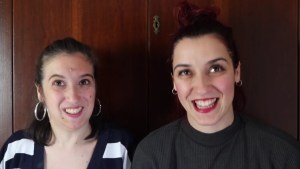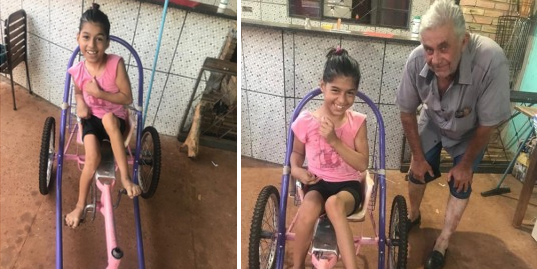Emily Bonfim Camargo, a 10-year-old girl from southern Brazil, has cerebral palsy. Because of her condition, her involuntary movements prevent her from holding objects with her hands or standing up. She’s never been able to walk, but that doesn’t mean she doesn’t have the same dreams and hopes as other children. In particular, she’s always wanted to ride a bicycle.
“That was her dream, and I had to do something to help,” her grandfather, Clovis Urias dos Santos, told Brazilian news outlet Sempre Familia.
The project wasn’t new territory for Clovis. Years ago, he mounted a seat on four wheels so Emily could move and play around the house.
“My father-in-law kept updating it as she grew up,” Emily’s mother, Roseli, recalls. But now Emily wanted to graduate to something closer to what her peers were using.
“She talked about it so much that I even took a picture of her on [a bike], as if she were pedaling. Then I framed the picture, and Emily just kept looking at it. It broke our hearts,” Clovis says.
First he tried to make his granddaughter’s dream come true by buying her a tricycle. Unfortunately, she was unable to hold the handlebars to guide the vehicle, and she couldn’t keep her balance on the seat. Her grandfather, however, isn’t a man who is easily discouraged or deterred.
“That’s when I decided to make a different tricycle that she could use,” he told Sempre Familia’s reporter Raquel Derevecki. “I couldn’t leave her like that. I had to get her up off the ground,” he said in an interview with Flávio Dias of G1.
In his home workshop, he started to think of how he could make a more stable tricycle for her. The 69-year-old former construction worker started to take things apart and put the useful pieces back together, to make something that looks photos like a hybrid between a lawn chair and a tricycle.
“I used two chairs to assemble everything, and three wheels. I installed the pedals with brakes, and I didn’t put on handlebars,” he told Sempre Familia.
This vehicle isn’t just fun; it’s also practical. Clovis added a basket behind the seat, so that Emily can carry her backpack for school, or some groceries, because she likes to go to the supermarket and bakery with him.
Emily’s special tricycle is also stylish. “After the bike was ready, I painted it pink and purple because Emily chose those colors. She was very happy, and I was even happier,” Clovis told Derevecki.
Roseli spoke of her great appreciation for her father-in-law, thanks to the special relationship Emily has with her grandfather. “He’s been an angel,” Emily’s mother says. “He helped make her dream of going out come true. He’s fantastic. Even without learning from a professional, he made the effort and managed to adapt objects so that my daughter could move on her own, and I’m really immensely grateful,” she told G1.
Roseli says the doctors didn’t notice her daughter’s illness when she was born. It wasn’t until Emily was five months old that the family realized something was wrong. It took various visits to doctors to finally get a clear diagnosis from a neurologist.
There’s no cure for cerebral palsy, although there are some medications to decrease involuntary muscle movements. Emily has no control over her upper limbs, can’t walk, and can only write with her left foot. She’s had a hard time doing her schoolwork, and has suffered chronic back pain from the contortions needed to write.
Fortunately, her situation is changing. Her grandfather Clovis’ tricycle invention started to make the Brazilian local news in late October of 2019, and the reports about her included an additional plea for help.
Her family wanted to buy her a specialized keyboard designed for people like her who can only write with their feet, but the cost was beyond their means. The keyboard was only available for rent, and the family would only be able to afford to pay for it for 16 months. Within two months, as reported by Região News in December 2019, two local businessmen had managed to buy a keyboard outright and donate it to the family.
There’s a video of the moment when Emily and her mother received the keyboard. Emily is seated on a couch wearing a lilac-colored dress, and her mother is holding the keyboard at the height of Emily’s feet. Although the video is in Portuguese, her smile and her mother’s gratitude need no translation.
What does the future hold for Emily? Only time will tell, but the ingenuity and solidarity of her family and community fill her future with hope. It’s an invitation for all of us to look around us at the needs of others, whether family or strangers, and ask ourselves how we can use our gifts to bring them greater hope and joy.

Read more:
Virginia was born with cerebral palsy, and couldn’t walk — now she’s opening a dance school

Read more:
This girl’s cerebral palsy didn’t stop her from saving her brother’s life

